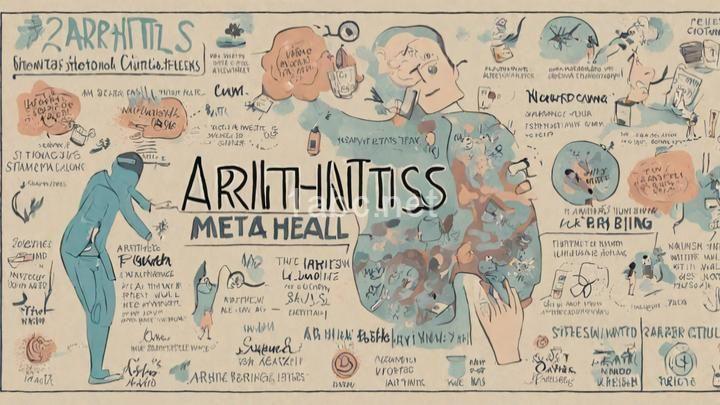Arthritis and Mental Health: Coping Strategies for Emotional Well-being

Introduction
Living with arthritis can be a challenging journey, both physically and emotionally. The pain, stiffness, and limitations that come with this condition can have a profound impact on one's mental health. In fact, studies have shown that individuals with arthritis are more likely to experience emotional challenges such as frustration, anxiety, and depression.
Understanding the Link Between Arthritis and Mental Health
Arthritis can take a toll on your emotional well-being in several ways. The constant pain and discomfort can leave you feeling frustrated and helpless. Simple tasks that were once effortless may now require extra effort, leading to feelings of anxiety and stress. Additionally, the unpredictability of arthritis flare-ups can make it difficult to plan or engage in activities, which can contribute to a sense of isolation and sadness.
To illustrate the emotional challenges faced by individuals with arthritis, let me share a relatable anecdote. Imagine waking up one morning with excruciating pain in your joints, making it almost impossible to get out of bed. The frustration and helplessness you would feel in that moment are just a glimpse of what individuals with arthritis experience on a daily basis. It's important to acknowledge and address these emotional challenges in order to achieve overall well-being.
Examining the Impact of Chronic Pain on Mental Health
Chronic pain is a common symptom of arthritis and can have a significant impact on mental health. When pain becomes constant and unrelenting, it can lead to a decrease in quality of life and an increase in emotional distress. This is where the concept of pain catastrophizing comes into play. Pain catastrophizing refers to the tendency to magnify the negative aspects of pain and to feel helpless in the face of it. This negative thinking pattern can exacerbate emotional distress and make it even harder to manage the challenges of arthritis.
Coping Strategies for Emotional Well-being
Building a Support Network
One of the most effective ways to cope with the emotional toll of arthritis is by building a strong support network. Seek out friends, family, or support groups who understand your struggles and can provide a listening ear or a shoulder to lean on. It's important to communicate your needs effectively to your loved ones, so they can better support you. Let them know when you need help or when you just need someone to talk to. Remember, you don't have to face this journey alone.
Seeking Professional Help
In addition to your support network, consider seeking professional help to manage your mental health. Therapy or counseling can be a valuable resource for individuals with arthritis, providing a safe space to explore and address the emotional challenges they face. Cognitive-behavioral therapy (CBT) is often recommended for individuals with chronic pain as it helps to identify and challenge negative thought patterns. Mindfulness-based stress reduction (MBSR) is another therapy option that focuses on cultivating mindfulness and reducing stress. By seeking professional help, you can develop effective coping strategies and gain a better understanding of your emotions.
Practicing Self-Care
Self-care is essential for maintaining emotional well-being when living with arthritis. Engaging in activities that bring you joy and relaxation can help alleviate stress and improve your overall mood. Consider incorporating regular exercise into your routine, as it has been shown to have both physical and mental health benefits. Relaxation techniques such as deep breathing exercises or meditation can also help reduce anxiety and promote a sense of calm. Find hobbies or activities that you enjoy and make time for them. Remember, taking care of yourself is not selfish, it's necessary.
Exploring Mind-Body Techniques
Mind-body techniques have gained popularity in recent years for their ability to improve both physical and mental well-being. Practices such as meditation, yoga, and tai chi have been shown to reduce stress, improve sleep, and increase overall feelings of well-being. If you're new to these practices, there are plenty of resources available online or in your community to help you get started. Start with just a few minutes a day and gradually increase the duration as you become more comfortable. The key is to find what works best for you and incorporate it into your daily routine.
Overcoming Mental Health Stigma
Unfortunately, there is still a stigma associated with both arthritis and mental health. Many people hold misconceptions or stereotypes about these conditions, which can make it even more challenging for individuals to seek help and support. It's important to challenge these stigmas and advocate for better understanding. By sharing our own experiences and educating others, we can help break down barriers and create a more inclusive and supportive environment.
Sharing Personal Stories of Resilience
To inspire and motivate individuals with arthritis, let's highlight some real-life examples of individuals who have successfully managed their arthritis while prioritizing their mental health. These stories of resilience remind us that we are not alone in our struggles and that it is possible to live a fulfilling and meaningful life despite the challenges of arthritis. Hearing how others have overcome adversity can provide hope and encouragement on our own journey.
Conclusion
In conclusion, the emotional well-being of individuals with arthritis is just as important as their physical health. By understanding the link between arthritis and mental health, implementing coping strategies for emotional well-being, and challenging the stigma associated with these conditions, we can empower ourselves and others to live a life full of joy and resilience. Remember, you are not defined by your arthritis. You are a strong and resilient individual capable of achieving emotional well-being alongside the challenges of arthritis.
FREQUENTLY ASKED QUESTIONS
What is the connection between arthritis and mental health?
The connection between arthritis and mental health is complex and multifaceted. People living with arthritis often experience chronic pain, fatigue, and limitations in their daily activities, which can take a toll on their mental well-being. The physical symptoms of arthritis can lead to increased stress, anxiety, and depression.Pain, in particular, plays a significant role in the relationship between arthritis and mental health. The constant discomfort and unpredictable nature of arthritis pain can lead to feelings of frustration, helplessness, and hopelessness. This can contribute to the development of anxiety and depression.
Furthermore, the limitations imposed by arthritis, such as difficulty in performing certain tasks or participating in activities that were once enjoyed, can lead to a sense of loss and decreased self-esteem. These emotional challenges can further contribute to the development of mental health issues.
On the other hand, mental health conditions can also have an impact on arthritis. Stress, anxiety, and depression can worsen the perception of pain and even increase inflammation in the body. This can create a vicious cycle where mental health issues exacerbate arthritis symptoms, and the worsening symptoms in turn further negatively impact mental well-being.
It is essential for individuals with arthritis to address both their physical and mental health needs. Seeking support from healthcare professionals, such as rheumatologists, psychologists, or counselors, can be beneficial. Treatment options may include a combination of medication, physical therapy, counseling, and self-care strategies.
Engaging in stress-reducing activities, such as mindfulness exercises, gentle exercise, and hobbies, can also contribute to improving mental well-being. Additionally, building a strong support network and connecting with others who understand the challenges of living with arthritis can provide valuable emotional support.
Remember, everyone's experience with arthritis and mental health is unique. It is crucial to consult with a healthcare professional to develop a personalized plan to manage both physical and mental health effectively.
How can I take care of my emotional well-being while living with arthritis?
Living with arthritis can be challenging, both physically and emotionally. Taking care of your emotional well-being is just as important as managing your physical symptoms. Here are some tips to help you maintain good emotional health while living with arthritis:
-
Stay informed: Educate yourself about arthritis and its management. Understanding your condition can help you feel more in control and reduce anxiety.
-
Build a support network: Connect with others who have arthritis or join support groups. Sharing experiences and advice can provide a sense of community and emotional support.
-
Practice self-care: Make time for activities that bring you joy and relaxation. Engage in hobbies, practice mindfulness or meditation, or simply take a walk in nature. Taking care of your mental health is crucial.
-
Seek professional help: If you find yourself struggling with negative emotions or anxiety, don't hesitate to seek help from a mental health professional. They can provide guidance and support tailored to your specific needs.
-
Stay active: Regular exercise can not only benefit your physical health but also improve your mood. Consult with your healthcare provider to develop an exercise plan that suits your abilities and limitations.
-
Manage stress: Arthritis can often be accompanied by stress. Find stress management techniques that work for you, such as deep breathing exercises, journaling, or engaging in activities that help you unwind.
-
Prioritize self-compassion: Be kind to yourself and acknowledge the challenges you face. Celebrate your accomplishments, no matter how small, and don't be too hard on yourself if you have difficult days.
Remember, taking care of your emotional well-being is a vital part of managing arthritis. By implementing these strategies and prioritizing your mental health, you can lead a fulfilling life while living with arthritis.
Are there any specific coping strategies that can help with arthritis-related anxiety?
Yes, there are several coping strategies that can help with arthritis-related anxiety. One effective strategy is practicing relaxation techniques, such as deep breathing exercises or progressive muscle relaxation. These techniques can help reduce stress and promote a sense of calmness. It's also important to engage in regular physical activity, as exercise has been shown to alleviate anxiety symptoms. Finding an exercise routine that suits your abilities and interests, such as swimming or yoga, can be beneficial. Additionally, seeking support from others who are going through similar experiences can provide emotional comfort and understanding. This can be achieved through joining support groups or connecting with others online. Lastly, staying informed about arthritis and its management can help alleviate anxiety by empowering you with knowledge and control over your condition. It's important to consult with your healthcare provider to determine the best coping strategies for your specific needs.
Can exercise help improve mental health for people with arthritis?
Yes, exercise can indeed help improve mental health for people with arthritis. Regular physical activity has been shown to have a positive impact on overall mental well-being, including reducing symptoms of depression and anxiety.When it comes to arthritis specifically, exercise can provide several benefits. Firstly, engaging in physical activity helps to strengthen the muscles around the joints, which can help alleviate pain and improve mobility. This can have a positive effect on one's mental state by reducing discomfort and increasing confidence in one's ability to move.
Exercise also promotes the release of endorphins, often referred to as "feel-good" hormones. These endorphins can help reduce stress levels and improve mood. Additionally, physical activity can provide a distraction from pain and negative thoughts, allowing individuals to focus on the present moment and experience a sense of accomplishment.
It is important to note that exercise for people with arthritis should be tailored to their specific needs and abilities. Low-impact activities such as swimming, cycling, and yoga are often recommended as they put less stress on the joints. It is advisable to consult with a healthcare professional or a physical therapist to develop an exercise plan that is safe and effective.
In conclusion, incorporating regular exercise into the routine of someone with arthritis can have a positive impact on their mental health. Not only does it help manage physical symptoms, but it also promotes overall well-being and a more positive outlook.



